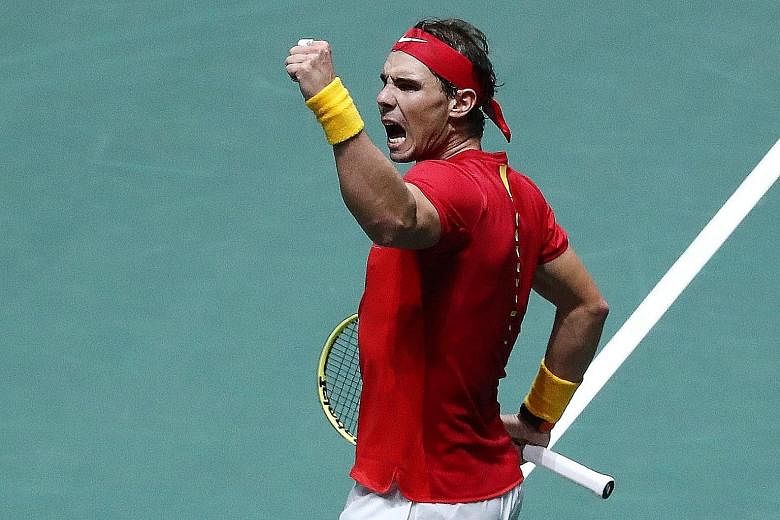MADRID • It is a short, if chilly, walk from the main court at the Caja Magica to the two other stadiums inside the sports complex.
But they were different tennis worlds on the second day of the new-look Davis Cup finals.
While Spain and Rafael Nadal played into early hours of yesterday, beating Russia 2-1 in front of a sell-out crowd of more than 12,000 on Centre Court, the United States and Australia - the two countries that have won the trophy more than any other - competed on much smaller, quieter stages.
Neither Court No. 2, with a capacity of 3,500, nor Court No. 3, with 2,500 seats, was close to full, which only made it clearer that attendance is one of the major problems facing this reworked competition.
"The atmosphere wasn't great," Australia's captain, Lleyton Hewitt, who has been vocal about his opposition to the format change, said after their 3-0 victory over Colombia. "That's the big problem, though, with playing at a neutral venue."
An official group of French tennis supporters has also boycotted the event in protest against the decision to scrap the traditional Davis Cup format, with its home-and-away finals and best-of-five matches.
"We understand their decision, but in a way, it penalises us," French doubles player Nicolas Mahut said after his team beat Japan 2-1 in a day session on Tuesday in front of only a few hundred fans. "We often won matches in the past because the fans carried us.
"When they aren't here, we miss them."
There are also plenty of other teething problems beyond the size of the crowds when Spain is not playing.
The tournament's new app had been roundly panned as being difficult to use and slow to update scores, as well as for providing few statistics and had to be relaunched on Tuesday.
Event timings are also an issue, and not just the November dates, when players are generally weary and often ailing after a nearly 11-month season.
With evening session team matches in Madrid starting at 6pm, late-night finishes are all but guaranteed.
"I went to bed at three in the morning," said Vasek Pospisil, who defeated Reilly Opelka 7-6 (7-5), 7-6 (9-7) to set up Canada's 2-1 victory over the US. Denis Shapovalov then beat Taylor Fritz, 7-6 (8-6), 6-3 before the Canadians forfeited the final doubles match.
Spain finished their victory over Russia shortly before 2am.
Top-ranked Nadal, who levelled the tie with a 6-3, 7-6 (9-7) win over Karen Khachanov, pointed out that "it (the timing) makes everything difficult".
He said: "It's tough on the players for recovery and tough on the fans because tomorrow is a workday. It is difficult to answer today. Let me wait until the tournament is over to have a clear and better opinion."
Nadal and his bleary-eyed teammates faced defending champions Croatia yesterday.
NYTIMES

